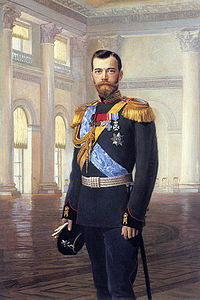Nikolai II and the fall of the Russian Empire
 Nikolai II (1868-1918), last emperor (Tsar) of Russia (1894-1917); one of the major European leaders of the pre-World War I era, he was deposed by the Russian Revolution of 1917.
Nikolai II (1868-1918), last emperor (Tsar) of Russia (1894-1917); one of the major European leaders of the pre-World War I era, he was deposed by the Russian Revolution of 1917.
The eldest son of Emperor Aliksandir III, Nikolai was born at Tsarskoye Selo (now Pushkin). Educated privately, he was married in 1894 to Alix of Hesse-Darmstadt, a German princess who took the name Aleksandra when she converted to Russian Orthodoxy. In the same year his father died, and he succeeded to the throne. Believing firmly in his duty to preserve absolute power in the Russian monarchy, he opposed any concessions to those favoring more democracy in government, but had little talent for leadership himself.
By 1905, the people of Russia had little faith in Nikolai's leadership. The defeat of the Russians in the Russo-Japanese War in 1904 had strained the Russian economy and Russian workers. In January 1905 Saint Petersburg was paralyzed by strikes. When workers and their families marched to Nikolai's home, the Winter Palace, to present their grievances to the tsar, soldiers fired into the crowd, giving the day the name "Bloody Sunday." Throughout Russia strikes, demonstrations, violence, and rioting took place. The czar's authority over the country was gone. Nikolai placed Sergei Witte in control of the government. Witte had been the former minister of finance and was largely responsible for the program of industrialization that Russia had followed since the 1890s. He knew that the tsar would either have to quell the revolts with total repression or lead the reform movement.
Nikolai agreed to reform Russia from an absolute monarchy to a constitutional monarchy with an elected assembly, the Duma. However, Nikolai manipulated the Duma to reduce its effectiveness, still believing that he was responsible only to God. In 1906 Prime Minister Peter Stolypin introduced a land reform that would have allowed the peasants to own the land they farmed. However, the reform was never fully implemented, and the agricultural system in Russia faced many problems, including overpopulation in cities, resistance to change, and lack of technology. Stolypin repressed any signs of discontent with terror and executions.
Between the revolutions of 1905 and 1917, the royal family began to rely on the advice of a mystic named Rasputin. Rasputin had gained influence in the royal court because he was able to help Alexei, the heir to the throne, who suffered from hemophilia. Aleksandra was so impressed by his abilities, she kept him at court, and he became the most influential person in her entourage. Because Nikolai was devoted to his wife and relied on her advice, he also was influenced by Rasputin. By 1911 Rasputin had appointed many of the high government officials, and most of his appointees were incapable. He was notorious throughout the country for his bizarre and flamboyant lifestyle. The royal family's close connection with Rasputin further alienated the monarchy from the Russian people.
An advocate of international cooperation, Nikolai supported the Hague Conferences in 1899 and 1907, which created the Permanent Court of Arbitration and formulated rules for the humane conduct of war, but failed to check Europe's growing arms race. Despite his personally friendly relations with his cousin, William II of Germany, their two countries were on opposite sides when World War I broke out in 1914.
Russia was unprepared for the war; there were shortages of ammunition and of officers to command the soldiers, as well as problems transporting food throughout Russia. After 1915, when Nikolai assumed personal command of the army, military failures were blamed on him, further damaging his reputation. In addition, while he was away from the royal court, his wife and Rasputin were in charge of internal affairs, which angered the people. Nikolai was forced to abdicate the throne after the Russian Revolution of March 1917, and Russia became a democratic republic. Nikolai and his family were held captive by the Bolsheviks until July 16, 1918, when they were shot by a firing squad.